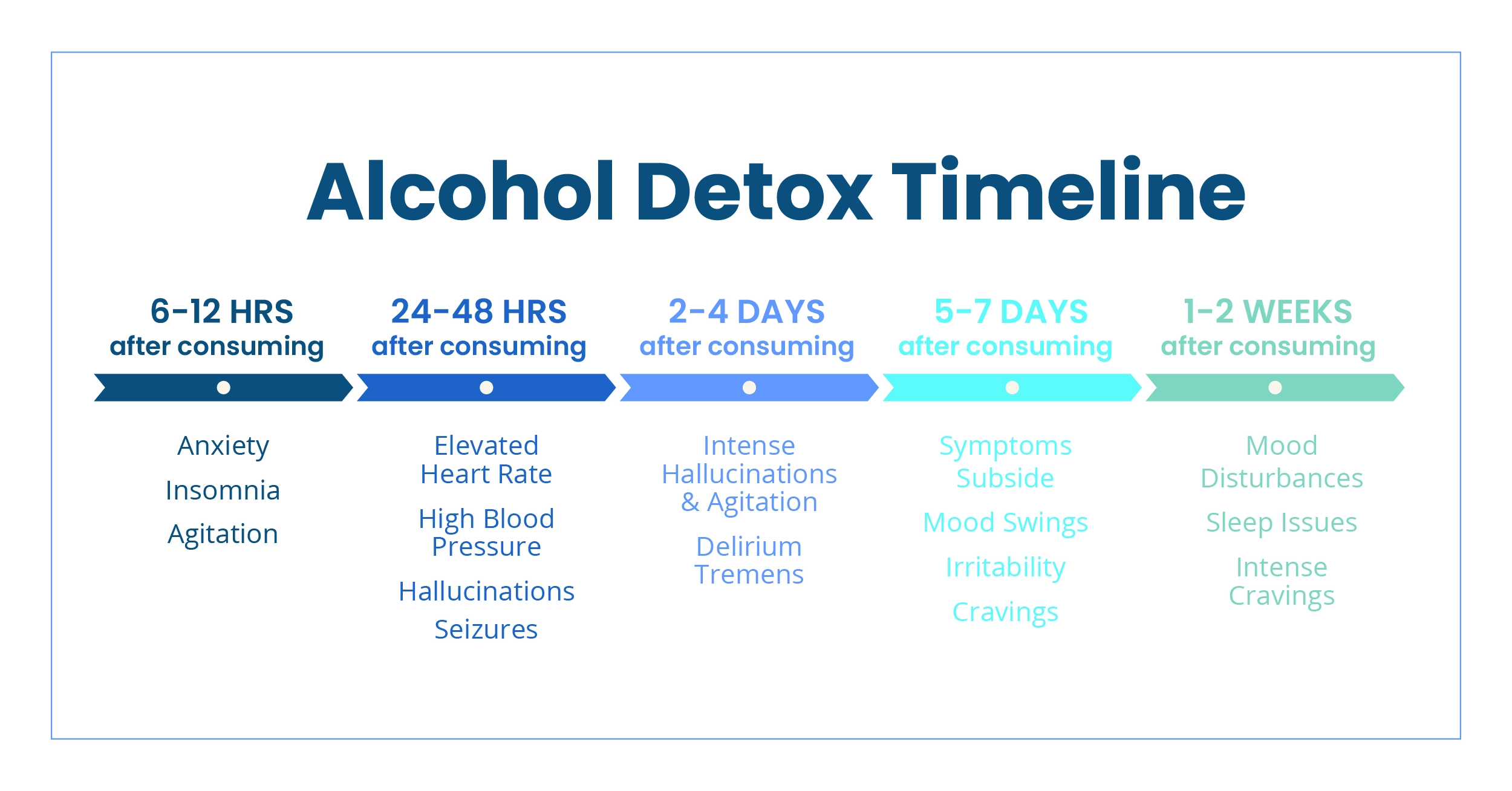What is the Goal of Alcohol Detox?
Detoxification, commonly known as detox, is the initial step in overcoming an addiction to a substance like alcohol. This involves the individual ridding their body of the substance before undergoing treatment like psychotherapy.
While deciding to undergo alcohol detox can be daunting, The Haven Detox is dedicated to providing a safe and secure environment that is as comfortable as possible. With 24/7 support from our trained staff and access to medication that helps alleviate the uncomfortable symptoms of withdrawal, patients at our rehab facility can recover from alcoholism safely.

What is Alcohol Use Disorder?
Alcohol use disorder (AUD) is a medical condition that centers around an individual’s inability to stop or limit their consumption of alcohol despite experiencing negative consequences. AUD can range from mild to severe, impacting their health and various aspects of their life, like relationships and occupation.
Long-term abuse of alcohol can lead to severe, sometimes irreversible conditions like liver disease, heart disease, and cancer. It is important to look out for symptoms if you believe you or a loved one is struggling with an alcohol problem to consult a medical professional as soon as possible. Addressing, diagnosing, and treating alcoholism right away is key to a smoother recovery.
Below are common signs of alcohol use disorder:
- Intense cravings to drink alcohol
- Inability to limit the amount of alcohol consumed
- Developing a tolerance and requiring more alcohol to reach the desired effects
- Neglecting responsibilities at home, work, school, etc.
- Drinking in risky situations, such as driving
- Spending a significant amount of money on alcohol
If you or a loved one are experiencing these symptoms, contact The Haven Detox-Little Rock at (501) 271-3342 to speak with one of our friendly counselors, available 24/7.
The Goal of Alcohol Detox
The primary goal of undergoing alcohol detox in a professional setting is to facilitate a safe and effective withdrawal from the substance while managing physical and psychological symptoms. Withdrawal can bring on severe, sometimes life-threatening symptoms like seizures and delirium tremens. In detox, a team of medical professionals is available 24/7 to help manage these risks.
Alcohol detox also aims to alleviate uncomfortable symptoms like anxiety, nausea, vomiting, and insomnia so that the patient can focus solely on recovering. Healthcare professionals at a rehab facility typically administer medications that can help lessen the severity of these symptoms.
The process of detoxing also focuses on stabilizing the individual’s physical and mental state to adequately prepare them for further treatment.
Alcohol Withdrawal Symptoms
Withdrawing from alcohol can manifest a range of symptoms that can vary in severity. The severity of these symptoms will depend on the individual’s level of alcohol dependence.
Below are common symptoms of alcohol withdrawal.
- Feelings of nervousness, restlessness, and apprehension
- Insomnia
- Nausea and vomiting
- Tremors
- Intense headaches
- Increased heart rate
- Hallucinations
- Seizures
Medications Used in Detox
There are a variety of medications that health professionals can administer to help alleviate the uncomfortable withdrawal symptoms. These medications allow the individual to safely navigate the process of detox and increase their chances for success.
These medications include:
- Benzodiazepines: Commonly prescribed to manage anxiety, insomnia, and agitation throughout withdrawal. It works by calming the central nervous system and reducing the risk of seizures.
- Anticonvulsants: Can be used to help prevent seizures by stabilizing the electrical activity in the brain.
- Naltrexone: Used to reduce alcohol cravings and prevent relapse by blocking the euphoric effects of alcohol.
- Acamprosate: Another medication that can help individuals maintain abstinence from alcohol by reducing the uncomfortable symptoms of withdrawal like anxiety, insomnia, and dysphoria.
It is important that these medications are used under the close supervision of healthcare professionals in order to ensure safe and effective use.
Alcohol Detox Timeline
The timeline of alcohol detox will often depend on factors like the severity of the dependence, the individual’s overall health, and co-occurring disorders. While the duration and intensity can vary, there is a general timeline of the process.
Within the initial 6-12 hours after consuming alcohol, withdrawal symptoms will typically begin. At this time, the individual may experience anxiety, insomnia, agitation, etc. Withdrawal will begin to intensify around 24-48 hours with symptoms like elevated heart rate and blood pressure. Some individuals may experience hallucinations or seizures during this time.
The peak of withdrawal symptoms arises around the 2-4 day mark, where symptoms such as hallucinations and severe agitation become more intense. Delirium tremens, a severe form of alcohol withdrawal involving confusion, disorientation, and potentially life-threatening cardiovascular disturbances, can happen during this time frame in some individuals.
From 5-7 days, physical symptoms will begin to subside, but these people may still experience symptoms that are more psychological, like mood swings, irritability, and intense cravings to drink.
At 1-2 weeks, psychological symptoms may still persist with continued symptoms like mod disturbances, sleep issues, and intense alcohol cravings.
Frequently Asked Questions (FAQ)
What happens in an alcohol detox?
During alcohol detox, individuals will undergo a supervised process aimed at safely withdrawing from the substance. Health professionals will provide medical monitoring and symptom management and help the individual stabilize their physical and mental state so that they can be prepared for further treatment. The goal is to allow for a smooth transition into comprehensive, long-term treatment programs for their alcohol addiction.
How bad is alcohol withdrawal?
Withdrawal from alcohol can vary in severity depending on the individual. The severity of withdrawal will often depend on the person’s severity of dependence, overall health, and co-occurring disorders. Medical professionals will be available around the clock to manage painful symptoms and can administer medication that will make the process easier.
What is the alcohol withdrawal timeline?
The initial symptoms of withdrawal are often present within 6-12 hours after consuming alcohol and will often escalate in the next 24-48 hours with increased anxiety and potentially life-threatening symptoms like seizures. The peak of withdrawal occurs between 2-4 days with individuals experiencing delirium tremens in severe cases. While physical symptoms often go away within a week, psychological symptoms, including mood swings and alcohol cravings, may continue for an extended period.
Detox from Alcohol with Support from The Haven Detox
At The Haven Detox-Little Rock, we understand that making the decision to detox from alcohol can be a daunting task. Our treatment facility aims to provide a safe and supportive environment where patients feel comfortable in recovery. The dedicated staff has years of experience in helping individuals overcome their addiction and get back to a normal life.
The residential program at The Haven Detox offers patients 24/7 medical monitoring and medication-assisted treatment to ensure a safe and effective withdrawal from alcohol. With a commitment to compassionate care and evidence-based interventions, The Haven Detox stands ready to guide individuals through the intricacies of alcohol detox and beyond, empowering them to reclaim control over their lives and embrace a healthier future. If you or a loved one is struggling with an alcohol use disorder, we are here to provide support. Contact one of our friendly counselors at (501) 271-3342 to learn more about our services.




